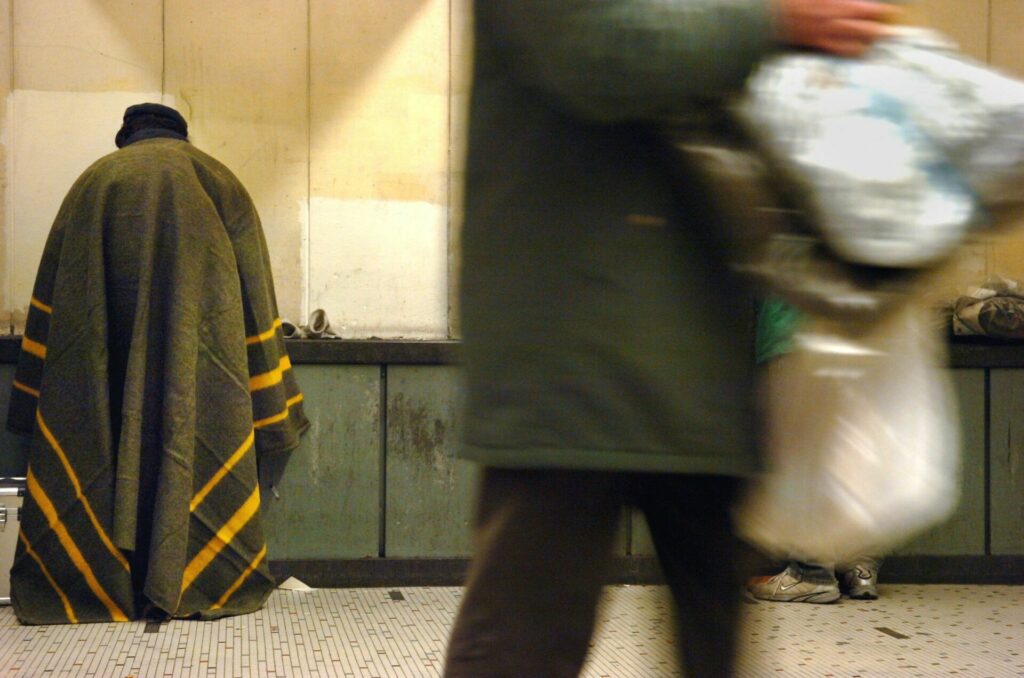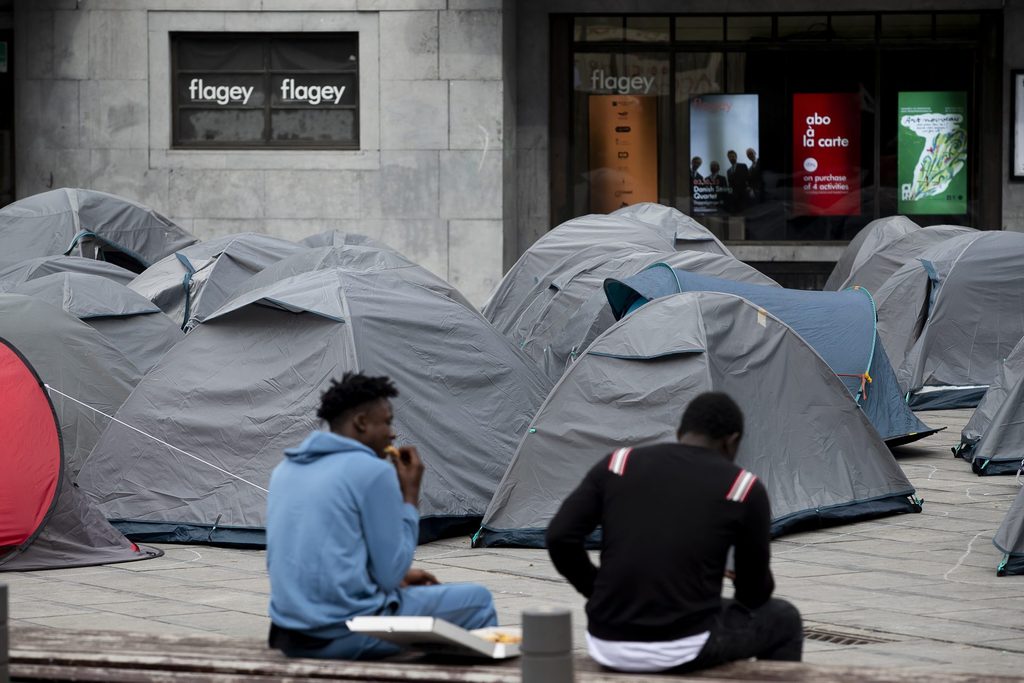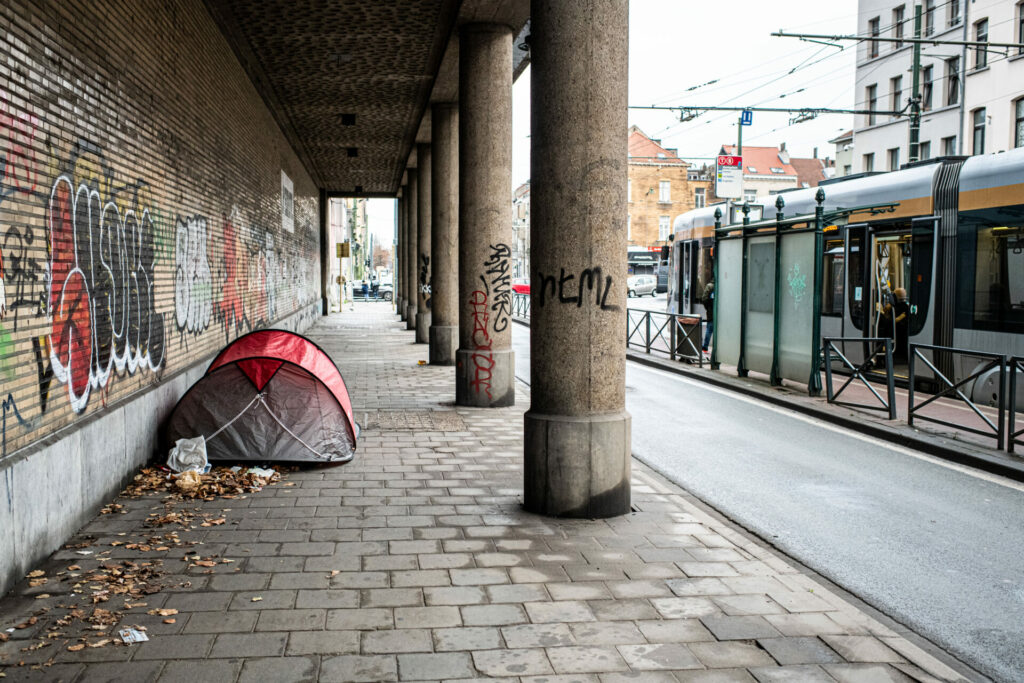For a while now, homeless organisations have been calling on the authorities to take meaningful action to improve the situation in Brussels. Ahead of the Belgian elections in June, they have now released ten priorities that can truly make a difference on the ground.
The rising number of homeless people in Brussels – over 7,000 according to the last count – brings many other problems with it, from open drug use at Brussels Metro stations, and thriving organised crime, to overworked social services.
"Anyone who wants to pursue a policy that aims to eradicate homelessness must dare to make courageous choices in various political domains," a collective of 11 organisations said in a joint memorandum in the run-up to the elections.
While local, regional and federal politicians have been campaigning to introduce tougher approaches, notably to increase the police presence on the streets and quicker deportation of arrested undocumented migrants, the organisations notably put the focus on prevention instead of cure.
With a view to the elections, they summed up ten areas that urgently need work, from housing to mental health care and urged the population to "vote well."
1. Access to affordable housing
While housing is a fundamental right, it is not guaranteed, the collective stressed. "In Brussels, the figures are alarming: more than 52,000 people are waiting for social housing, rents continue to rise – with the most precarious people spending up to 70% of their budget on housing – and 40% of Brussels residents at risk of precarity and social exclusion."
The homelessness sector is calling for structural measures to guarantee affordable housing for every Brussels citizen who is homeless or poorly housed.
2. Better guidance for mental health issues and drug use
"Successive crises have led to increased mental health problems and drug-related harm," the organisations said. "Homelessness services are facing an explosion of mental health and addiction problems, usually without the resources or expertise to deal with them."

Credit: Belga / Etienne Ansotte
To solve this problem, they are calling for strengthening the mental health sector and introducing ambitious public policies to reduce the risks of drug use.
3. Easier assess to social rights
"In Belgium, access to certain social rights such as the health insurance fund and the Public Centres for Social Welfare is inseparably linked to obtaining a home," the organisations stressed.
However, hundreds of people currently do not have access to basic rights because they do not have a home or a fixed address. "For years, the social sector has been asking not to link people's rights to an address, to abolish the status of cohabiting, to facilitate access to a reference address and to maintain physical service counters."
4. Give shelter to asylum seekers
"The Federal Government has not fulfilled its obligation to accommodate asylum seekers in Belgium for months," the organisations stated. "Despite numerous judicial convictions, both at Belgian and European level, the government refused to act with the necessary force."
This, they said, will create thousands more homeless people in Brussels, which will in turn lead to a whole list of other problems as well. "Belgium must once again respect the law and grant shelter to every asylum seeker."
5. Better protection for the most vulnerable
People without official documents are the most vulnerable people on the street, as their lack of valid papers means they have no right to social security or housing.

Credit: Belga / Kristof Van Accom
"Many of them do not have an address, meaning they can't register at a municipality and can't find work – they essentially don't have any rights. It is a vicious cycle," Bram Van de Putte, coordinator of the SubLINK project, told The Brussels Times last month. "We try to get them back into society by looking for temporary housing and a job."
6. Guarantee housing for those leaving institutions
Housing should be guaranteed for people leaving prisons, hospitals and youth institutions – who are usually in a very precarious position – to make sure they do not end up back on the streets.
"Despite the fact that promoting reintegration is a basic principle of several laws and decrees, we apparently fail to properly support people who want to rebuild their lives after detention," they said. "The transition from life in an institution to freedom is profound. People often do not find their way to appropriate help and services, suitable housing and a place in the labour market."
7. Different needs, one remedy?
The importance of providing assistance tailored to audiences with specific needs cannot be overstated, they organisations stressed. People often assume that a homeless person's difficulties can be solved with a house, but the reality is not that simple and a number of long-term challenges need to be taken into account.
"Especially with people who have been on the street for years, a whole mechanism of change needs to be kickstarted before they are ready to accept housing," they said. "There are as many reasons for being on the street as there are people on the street. Everybody has their own story."
8. Saturated services
Waiting lists for all kinds of help are incredibly long in Belgium, the organisations stressed. The teams and services helping homeless people need to be strengthened and multidisciplinary approaches should be made possible.
"Securing a pre-hospitalisation visit with a doctor to arrange addiction care takes six weeks, and then people have to wait some more months before the hospitalisation can actually take place. Getting an appointment with a psychologist often takes months, and waiting lists for social housing sometimes take up to ten years."
On top of that, single male asylum seekers in Belgium have not been getting the shelter they are legally entitled to for over half a year now, as State Secretary for Asylum and Migration Nicole de Moor has argued that shelters are simply at full capacity – leaving hundreds of people sleeping rough.
9. Overworked staff
There is a major shortage of social workers in general and in the homeless sector in particular. The job of social worker was recently recognised as a 'bottleneck profession' (jobs for which employers are struggling to fill their vacancies) in the Brussels-Capital Region, and it remains a challenge for organisation to retain employees due to the difficult working conditions and the lack of recognition for their work done.
"We therefore call for a general wage increase to make working in our sector more attractive and a recognition of the danger in our work," they stressed. "This means a review of pay scales for all positions, from specialised educators to managerial staff, including support functions (secretariat, IT, human resources, logistics, etc.)."
10. Coordinate the work
The issue of homelessness lies at the intersection of several policy areas such as social, housing, health, employment and migration, among others. "Therefore, an integrated, cross-cutting and coordinated approach is essential," said the Straatverplegers/Infirmiers de Rue association.
To achieve convincing results in the area of homelessness, they call for all housing competencies for homeless people to be entrusted to a single Minister, and for the Brussels-Capital Region to adopt "a strategic and quantified regional plan to prevent and combat homelessness" that is in line with Belgium's international commitments.


